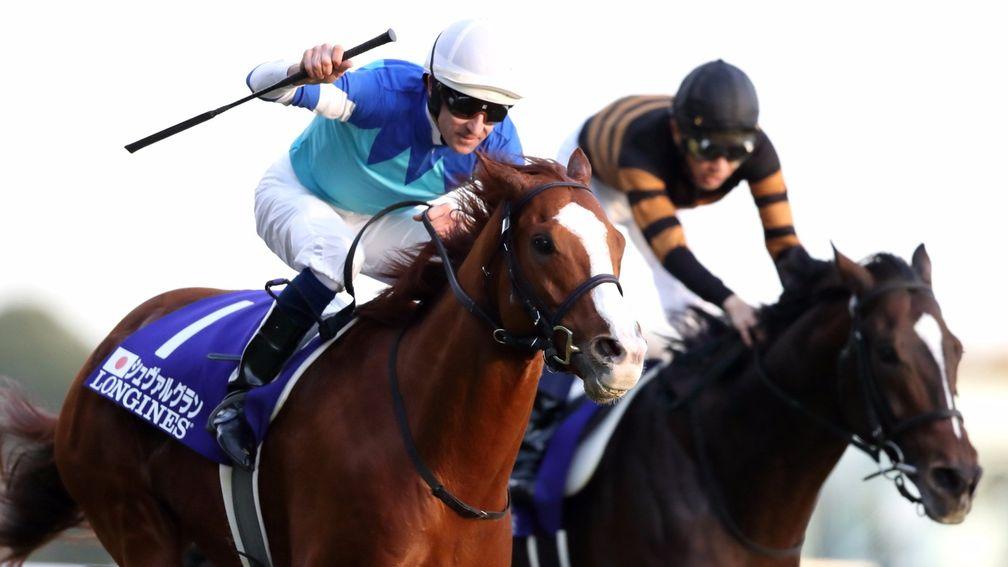Japanese King George challenge crowns 20 years of work from Ascot

It was only in 2016 that the Prix de l'Arc de Triomphe became the first foreign race to attract domestic pool betting in Japan and since then the world's major racecourses have been engaged in a scramble to attract runners from the country, hoping to earn a sliver of the world's biggest betting market.
But while Cheval Grand is set to become the second Japanese runner at Ascot this year – following on from Deirdre in the Prince of Wales's Stakes last month – the course has been working hard to attract the cream of international talent for much longer than there has been any tangible financial benefit.
"The international programme has a varied and long-term strategy over 20 years and Japanese middle-distance horses have been at or very near to the top of our wishlist," said Ascot's director of racing and communications Nick Smith.
"Japanese horses running overseas is a really big deal on almost any metric you can think of. Principally the main reason for bringing these horses over is because we want to showcase international racing and that has been the motivation since we started.

"But in the modern world the cycle is now complete because, while the reputational benefits of having these horses remains as significant as ever, it now has a material benefit in terms of the engagement from visiting countries, especially from Japan."
While the exact details of what one course or another can expect to recoup from the JRA pools if they host a Japanese runner are not made public, the rewards can be considerable.
More than one international deal is believed to have been settled at three per cent of domestic turnover on a race with a Japanese runner. The Arc still dominates JRA betting on foreign races, accounting for 23 per cent of the total in 2018 but, even a more modest take such as the ¥805,132,200 or £5.95 million taken on the Dubai Turf would have been worth more than £178,000 to the organisers.
Smith says that the financial incentives are secondary but does not deny that the course is beginning to see a monetary return on its long-term commitment.

He said: "Bringing in horses from overseas has never been predicated on financial returns and it has been a costly exercise over 20 years to bring horses in, although one which is now leading to opportunities for financial return.
"In terms of Japan I think it is well known that when a Japanese horse runs, you get a clip of the ticket. That is very welcome but it is very much an add-on.
"In terms of wider relationships like the one with the Hong Kong Jockey Club, we didn't have a Hong Kong horse at Royal Ascot unfortunately this year but we worked with them in partnership with the World Pool venture.
"We have a unified international strategy which brings in horses on the track, betting opportunities including World Pool when the time is right, media coverage and then perhaps the next stage could be sponsorship opportunities, who knows?"
Ascot's love affair with the country is unlikely to cool anytime soon, with the course hosting both newly minted Women's World Champion Nanako Fujita and Japan's championship leader Yuga Kawada at the Shergar Cup next month, guaranteeing another huge media presence.
Members can read the latest exclusive interviews, news analysis and comment available from 6pm daily on racingpost.com
Published on inNews
Last updated
- Join Racing Post Members' Club for the very best in racing journalism - including Patrick Mullins' unmissable trip to see Gordon Elliott
- Racing Post Members' Club: 50% off your first three months
- Join the same team as Ryan Moore, Harry Cobden and other top jockeys with 50% off Racing Post Members' Club
- 'It’s really exciting we can connect Wentworth's story to Stubbs' - last chance to catch master painter's homecoming
- The jumps season is getting into full swing - and now is the perfect time to join Racing Post Members' Club with 50% off
- Join Racing Post Members' Club for the very best in racing journalism - including Patrick Mullins' unmissable trip to see Gordon Elliott
- Racing Post Members' Club: 50% off your first three months
- Join the same team as Ryan Moore, Harry Cobden and other top jockeys with 50% off Racing Post Members' Club
- 'It’s really exciting we can connect Wentworth's story to Stubbs' - last chance to catch master painter's homecoming
- The jumps season is getting into full swing - and now is the perfect time to join Racing Post Members' Club with 50% off